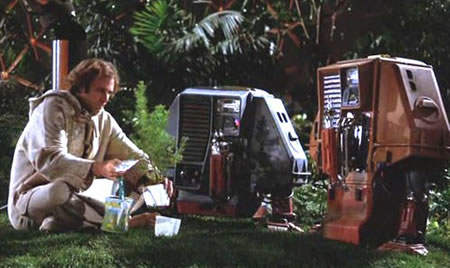Science Fiction
Dictionary
A B C D E F G H I J K L M N O P Q R S T U V W X Y Z
Tasty Space Lettuce!

Astronauts finally get to eat some tasty space greens, rather than just sending them back to Earth like they did last year (see NASA Harvests Lettuce On ISS).
(Tasty space lettuce!)
The astronauts will clean the leafy greens with citric acid-based, food safe sanitizing wipes before consuming them. They will eat half of the space bounty, setting aside the other half to be packaged and frozen on the station until it can be returned to Earth for scientific analysis.NASA's plant experiment, called Veg-01, is being used to study the in-orbit function and performance of the plant growth facility and its rooting "pillows," which contain the seeds.
NASA is maturing Veggie technology aboard the space station to provide future pioneers with a sustainable food supplement Ė a critical part of NASAís Journey to Mars. As NASA moves toward long-duration exploration missions farther into the solar system, Veggie will be a resource for crew food growth and consumption. It also could be used by astronauts for recreational gardening activities during deep space missions.
Time to dig in!
Generations of science fiction fans recall potential uses for plants in space, thanks in part to engineer and sf writer George O. Smith. He created the idea of "Martian sawgrass" to provide oxygen in his 1942 story QRM - Interplanetary.
Gregory Benford thought about lifezones, pod-like greenhouses that could be attached to the exterior of large space ships.
Fans of the 1972 movie Silent Running may recall that Bruce Dern took tended his garden with the help of robots.

(Gardening robots from Silent Running)
Why test vegetables grown in space
Via NASA.
Scroll down for more stories in the same category. (Story submitted 8/7/2015)
Follow this kind of news @Technovelgy.| Email | RSS | Blog It | Stumble | del.icio.us | Digg | Reddit |
Would
you like to contribute a story tip?
It's easy:
Get the URL of the story, and the related sf author, and add
it here.
Comment/Join discussion ( 0 )
Related News Stories - (" Food ")
A Beautiful Visualization Of Compact Food
'The German chemists have discovered how to supply the needed elements in compact, undiluted form...' - Edward Page Mitchell (1879).
Thermostabilized Wet Meat Product (NASA Prototype)
There are no orbiting Michelin stars. Yet.
Edible Meat-Like Fungus Like Barbara Hambly's Slunch?
'It was almost unheard of for slunch to spread that fast...' - Barbara Hambly, 1985.
Holland Factory 3D Printing 500 Tons Of Steak Per Month
'...I donít understand technical things ó tell me, does it ever feel anything?" - Margaret St. Clair, 1955.
Technovelgy (that's tech-novel-gee!) is devoted to the creative science inventions and ideas of sf authors. Look for the Invention Category that interests you, the Glossary, the Invention Timeline, or see what's New.
Science Fiction
Timeline
1600-1899
1900-1939
1940's 1950's
1960's 1970's
1980's 1990's
2000's 2010's
Current News
The New Habitable Zones Include Asimov's Ribbon Worlds
'...there's a narrow belt where the climate is moderate.'
Can One Robot Do Many Tasks?
'... with the Master-operator all you have to do is push one! A remarkable achievement!'
Atlas Robot Makes Uncomfortable Movements
'Not like me. A T-1000, advanced prototype. A mimetic poly-alloy. Liquid metal.'
Boring Company Drills Asimov's Single Vehicle Tunnels
'It was riddled with holes that were the mouths of tunnels.'
Humanoid Robots Tickle The Ivories
'The massive feet working the pedals, arms and hands flashing and glinting...'
A Remarkable Coincidence
'There is a philosophical problem of some difficulty here...'
Cortex 1 - Today A Warehouse, Tomorrow A Calculator Planet
'There were cubic miles of it, and it glistened like a silvery Christmas tree...'
Perching Ambush Drones
'On the chest of drawers something was perched.'
Leader-Follower Autonomous Vehicle Technology
'Jason had been guiding the caravan of cars as usual...'
Golf Ball Test Robot Wears Them Out
"The robot solemnly hit a ball against the wall, picked it up and teed it, hit it again, over and again...'
Boring Company Vegas Loop Like Asimov Said
'There was a wall ahead... It was riddled with holes that were the mouths of tunnels.'
Rigid Metallic Clothing From Science Fiction To You
'...support the interior human structure against Jupiterís pull.'
Is The Seattle Ultrasonics C-200 A Heinlein Vibroblade?
'It ain't a vibroblade. It's steel. Messy.'
Roborock Saros Z70 Is A Robot Vacuum With An Arm
'Anything larger than a BB shot it picked up and placed in a tray...'
A Beautiful Visualization Of Compact Food
'The German chemists have discovered how to supply the needed elements in compact, undiluted form...'
Bone-Building Drug Evenity Approved
'Compounds devised by the biochemists for the rapid building of bone...'
